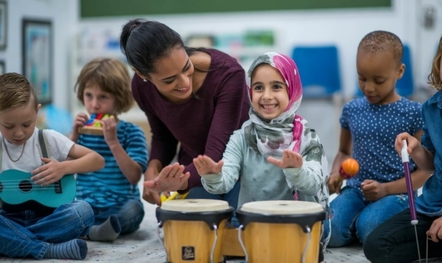New York, NY (Top40 Charts) Have you ever had your mood instantly improved by a song on the radio? Studies have shown that music has an immense effect on hormone production in the brain, both short and long-term. While listening to music can improve mood and cognition, learning music can have greater effects. The following three points are ways that music education can benefit you socially and mentally.
Improved Stress Levels
Perhaps the most noticeable effect of music education is lowered stress levels. When you listen to music you like, your brain begins to produce serotonin and oxytocin, which give you the classic "warm and fuzzy" feeling. These hormones will help erase stress and replace it with relaxation the longer the music is on. Playing an instrument or singing engages the brain even more intensely. When you make music, multiple centers of your brain turn on, including the ones responsible for holding emotional responses. This helps you learn to regulate your emotions better through pattern recognition.
On the physical side, making music can lower your blood pressure and heart rate, allowing your body to slip into a relaxed state. When you're stressed, your blood pressure and heart rate will be elevated, which keeps your body from resting properly. Over time, this lack of rest can damage your tissues and make you sick. Something as simple as learning easy piano songs can help reduce the tension in your body, allowing your tissues to begin healing and repairing themselves. When your body is relaxed, it's able to heal and strengthen its immunity, which will help you stay healthy in the long run. By picking up an instrument or singing with the radio, you can reduce stress and let your body recover.
Enhanced Processing Skills
Music education also has an immense effect on the brain's processing skills. In recent years, multiple studies have been done on how learning music helps the brain develop. One of the most noticeable chances music education has made on developing brains is larger vocabulary and reading abilities. When you learn how to play or make music, multiple centers of your brain are used. These centers get stronger with use and eventually can read and retain language better. In addition to increasing vocabulary talents, music education also improves memory over time. When you learn music, you'll not only be able to process things faster; you'll be able to remember them longer.
Music education also greatly improves both auditory and physical motor skills. This benefit is easy to understand, as reading and playing music requires some degree of hand-eye coordination. When you learn how to play music, you learn how to put together different movements and sounds that you might not normally use. For example, you may not use the tips of your fingers to tap out rhythms in your daily life, but playing the piano will strengthen that aspect of your motor skills. By investing in your own music education, you can improve your mental processing skills.
Reduced Behavioral Disturbances
Finally, learning music can reduce behavioral disturbances. While this may not necessarily apply to you, it can probably apply to someone in your life. Studies have shown that students who learn music in school have a higher attendance record than those who don't. A greater attendance rate means more time spent learning and less time getting in trouble. The more kids are in school, the greater chances of success they'll have. If something as simple as a music program can help improve test scores and graduation rates, it's a worthy investment.
Music education can also improve autistic and dyslexic engagement. Because these disabilities cause the brain to view the world differently, it can be difficult for neurotypical people to communicate effectively with their neurodivergent friends. Learning music can help mitigate some of the worse symptoms of autistic and dyslexic shutdown, allowing caregivers and friends to communicate with the individual more easily. Additionally, studies have shown that children with learning disabilities can focus better when there is music playing because of the calming effects on the brain. By offering music education, schools can reduce behavioral disturbances and improve their graduation rates.
Overall, music education is a powerful personal and social tool. Not only can you improve your personal life by learning how to play music, but you can improve your social life as well.
























